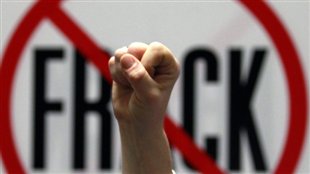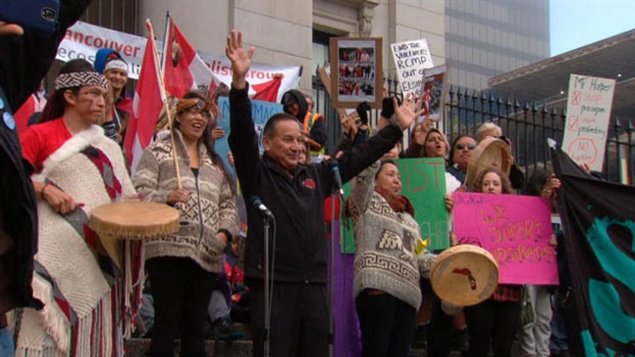Native protests against shale gas exploration got violent last week in the eastern province of New Brunswick, while fracking operations are in full swing in western Canada.
Forcing water and chemicals under high pressure to release gas has gone on in Canada’s west for between 50 and 60 years. But new techniques have made the process more efficient and more companies want to exploit them.
While western Canadians are used to oil and gas extraction and somewhat less concerned about environmental consequences, there is vigorous opposition from some native communities and advocacy groups.

“What’s happening to the water?”
“Who knows what happens when you fracture the rock,” says David Israelson, an environmental writer who has researched both sides of the issue. “In addition to releasing gas, which is your objective, where is that water loaded with chemical compounds going? What’s happening to the water underneath, the ground water? We’re increasingly reliant on ground water in Canada. Some parts of Canada are 100 per cent reliant on ground water. We have to wonder what we’re doing to the water. In some places it needs a lot more research, is what people say.”
The vigorous protest against exploration led the premier of New Brunswick to assure First Nations leaders that the fracking industry would be developed in a way that would be safe for the environment and in consultation with aboriginal communities. He told the Globe he is determined to see a shale gas industry develop in the province.
“No way” say aboriginal leaders
No way, said Robert Levy, a band councillor and former chief of the Elsipogtog First Nation. He said his community would absolutely not agree to any form of fracking on or near native land. Last Thursday, police cars were set ablaze, rocks were heaved and police used pepper-spray on protesters. Things are calmer now, but protesters remain at an encampment near the exploration site.

“The Canadian government has eviscerated environmental laws”
What Canadian opponents can do to stop fracking is limited, according to Israelson. “The Canadian government has eviscerated our environment laws… and they’ve tilted the balance for (environmental) hearings so that you have to go through a lot of hoops even to be able to participate in a meaningful way in hearings. And that may be why you’re seeing people frustrated and taking to the streets and protesting. They don’t have another avenue to make their point.”
How much shale gas extraction goes on in Canada will greatly depend on whether individual communities accept it or not, says Israelson. Opinions vary across the country. The French-speaking province of Quebec has banned fracking with the support of all parties, while western provinces like Saskatchewan encourage it.
A news conference is set for tomorrow, Friday, where the citizens’ advocacy group, Council of Canadians, will outline its opposition to shale gas extraction.







For reasons beyond our control, and for an undetermined period of time, our comment section is now closed. However, our social networks remain open to your contributions.